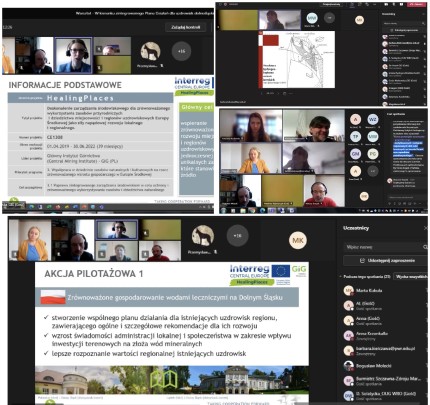On the 28th of February, regional workshop organized online by the Institute for Territorial Development took place in Poland
During the workshop IRT, GIG, and stakeholders from various environments (e.g. scientists, subject experts, local government, and health resort authorities) were discussing the Integrated Action Plan for Spas in Lower Silesia.
The workshop consisted of two main parts. In the beginning, Małgorzata Markowska from the Central Mining Institute (GIG) presented the experiences of the Healing Places project. Then Przemysław Malczewski from the Institute of Territorial Development and Paweł Łabaj from GIG presented the project tools: a map of medical water resources and a tool for assessing anthropopressure related to spa and tourist activities on natural resources.
In the second part, Magdalena Belof from IRT explains why integrated actions are needed to support spas. She explained the various problems associated with the management of spa and medical water and the initiatives that have been taken so far in this area.
Then Barbara Kiełczawa from Wrocław University of Technology presented the topic of healing waters, their types, properties, occurrence, and related problems. She also explained the differences between the supply zone, runoff zone, and drainage area, and the impact of land use on the healing water deposits.
The last speech was an introduction to the discussion on the action plan for Lower Silesian spas. It is assumed that the Action Plan will be developed in consultation with entities interested in the subject of Spas. Based on the results of the diagnosis, the objective is to ensure an effective and sustainable management of resources in the spas of Lower Silesia. Initially, the IRT defined six areas of activity, that is:
I Improving the law;
II Decision support tools;
III Strengthening the health resort issues in the local government policy;
IV Cross-border cooperation;
V Spas as a regional public good;
VI Spas as the engine of the regional economy.
Within each of the areas, Katarzyna Acedońska presented examples of specific activities (e.g. lobbying for the improvement of provisions and regulations regarding spas and their resources) along with the determination of the level of responsibility (local, regional, national, EU) and the assignment of key entities involved.
The last point of the workshop was an open discussion, which showed that the main problem in spa management is inconsistent legal regulations.

